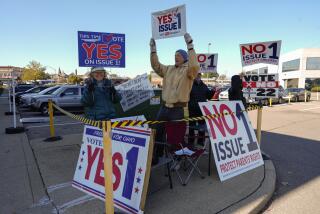House Ready to Allow Statehood Vote in Puerto Rico
- Share via
WASHINGTON — One hundred years after Puerto Rico was seized by the United States, the House was poised Wednesday night to allow the Caribbean island to choose to become the 51st state, remain a commonwealth or split off and become an independent nation.
“Finally, this has become a national issue,” said Democrat Carlos Romero-Barcelo, the island’s nonvoting delegate in the House and a statehood advocate. “The more the people of this nation look at this, they will see it not as a Puerto Rican problem but an American problem. How can we have 3.8 million disenfranchised Americans?”
Even with the expected House approval of the plebiscite among Puerto Ricans, the status of the Spanish-speaking island, annexed during the Spanish-American War, remains as unsettled as ever.
Senate Majority Leader Trent Lott (R-Miss.) has indicated that it is unlikely the Senate will consider similar legislation this year. And Puerto Ricans themselves, proud of both their heritage and their ties to the United States, are intensely divided on the best course for their homeland.
In 1993, residents of the densely populated island just 1,000 miles southeast of Miami indicated by a narrow margin that they preferred to remain a U.S. commonwealth. In the nonbinding vote, commonwealth status won 48% of the vote, statehood was backed by 46.2% and independence won support from just 4.4%.
That difference of opinion was obvious Wednesday, with the four members of the House that are of Puerto Rican descent split on the legislation. Romero-Barcelo and Rep. Jose E. Serrano (D-N.Y.) favored the plebiscite, while Reps. Luis V. Gutierrez (D-Ill.) and Nydia M. Velazquez (D-N.Y.) argued that Puerto Ricans already had spoken in favor of remaining a commonwealth.
The House bill calls for an island-wide vote by the end of this year. Then, based on the results, Congress and the president would set up a process for either statehood or independence in coming years. If commonwealth status were to win, Puerto Ricans would continue to vote on the issue every decade.
The cost of the balloting would be paid for in a uniquely Caribbean way--through taxes on rum.
House Republican leaders have pushed Puerto Rican statehood as part of an effort to reach out to Latino voters. Several polls have found that many Latinos feel alienated from the GOP, an attitude stemming in part from California’s passage of Proposition 187 in 1994. That initiative, which cut government service to illegal immigrants, was spearheaded by Republican Gov. Pete Wilson.
Among other controversial GOP-backed measures in recent years was a 1996 bill to make English the official language of the United States, which passed in the House but was never taken up by the Senate. Republicans backed off on that concept during Wednesday’s debate.
With hundreds of Puerto Ricans following the proceedings from the visitors’ gallery, lawmakers rejected a contentious amendment offered by Rep. Gerald B.H. Solomon (R-N.Y.) that would have declared English the official language in Puerto Rico and the rest of the country--even though just a quarter of Puerto Ricans are fluent in English.
House Minority Leader Richard A. Gephardt (D-Mo.) called that proposal “a slap in the face of the people of Puerto Rico.”
As a bipartisan alternative, lawmakers agreed that it is “in the best interest of the nation for Puerto Rico to promote the teaching of English” and that the island ought to teach English-language proficiency to students by the age of 10.
Puerto Rico, which has 3.8 million residents, has been a U.S. territory since 1898. Congress voted citizenship for Puerto Ricans in 1917. In 1952, it became a commonwealth, an in-between status.
Along with having no voting representatives in Congress, Puerto Ricans--despite their citizenship status--cannot vote in presidential elections. Statehood advocates made these points their rallying cry during floor debate.
“I am the sole representative to this House for the 3.8 million U.S. citizens of Puerto Rico and I cannot vote,” said Romero-Barcelo. “This is defining legislation for my constituents . . . and yet, I cannot vote. This legislation would end 100 years of Puerto Rico’s colonial relationship with the nation, yet I cannot vote.”
Debate steered clear of the many economic implications of statehood. As much as 40% of the island’s economy is based on a special exemption that allows U.S. manufacturers to avoid paying any federal tax on profits there. As a state, it could lose that exemption.
Federal payments to the state of Puerto Rico, where the majority of residents receive some form of government assistance, likely would increase substantially. But residents, who have a per-capita income of just $7,662 a year, would also be forced to pay federal income tax, from which they are now exempt.
More to Read
Sign up for Essential California
The most important California stories and recommendations in your inbox every morning.
You may occasionally receive promotional content from the Los Angeles Times.













